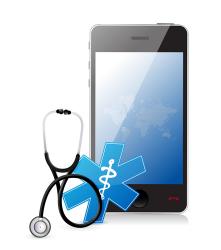First published in the McGill Daily
 The mobile phone is closer and closer to becoming a universal device. Banking, media, and communication are now on our mobile devices. One can envision a near future where our lives could fit into our back pocket.
The mobile phone is closer and closer to becoming a universal device. Banking, media, and communication are now on our mobile devices. One can envision a near future where our lives could fit into our back pocket.
First published in the McGill Daily
 The mobile phone is closer and closer to becoming a universal device. Banking, media, and communication are now on our mobile devices. One can envision a near future where our lives could fit into our back pocket.
The mobile phone is closer and closer to becoming a universal device. Banking, media, and communication are now on our mobile devices. One can envision a near future where our lives could fit into our back pocket.
Mobile health (mHealth) refers to health applications (apps) on mobile devices. In an age where healthcare costs are increasing and accessibility is decreasing, mHealth provides an avenue through which the growing needs of the population might be met. Though this emerging technology holds much potential, there are still issues that must be addressed.
Internet-based healthcare services for self-diagnosis and advice have been around for a while. Websites such as WebMD provide the tools for online self-diagnosis and direct individuals to see a nurse, doctor, or go to the emergency room if needed.
mHealth technology has the ability to empower individuals to take care of their own health and well-being. According to Shivani Goyal, a researcher at the Centre for Global eHealth Innovation in Toronto, there are two major approaches to mobile technology. One is to help people engage in preventative health by using mobile phones to track, assess, and change bad behaviours. The other is to help people manage long-term conditions requiring medication or careful monitoring.
“Mobile health is changing the model of current healthcare. It’s enabling patients to be informed about their own medical information,” Goyal told The Daily. The Centre for Global eHealth Innovation has developed a number of mHealth applications. These mobile self-management applications include “bant” for individuals with diabetes to collect and track their blood glucose levels, and “breathe” for people with asthma to engage in their own treatment plans.
Another mobile technology application is medical screening. Dr. Nitika Pant Pai, a professor in the Department of Medicine at McGill University, has developed an HIV self-screening smartphone application.
“Mobile health is changing the model of current healthcare. It’s enabling patients to be informed about their own medical information.”
“The patients want access to quality care, they want to be seen quickly, and they want confidentiality,” explained Pai. Before developing the HIV screening app, Pai scouted the field for existing apps and found that many had not been tested or tailored to patients. This provided her main motivation to develop the technology herself.
One of the biggest concerns for existing mHealth technologies is quality control. Currently, there are over 17,000 mHealth applications available to download on app stores, but only a small volume of those have gone through proper evidence-based testing.
“People have to be cognizant of the fact that there are a mixture of people who are making these apps. I would caution people going onto the app store to do research to see where the apps are coming from, who is designing them, and read reviews about their functions,” Shivani told The Daily.
Though the Food and Drug Administration in the United States has made moves to properly test and approve mobile apps used for health procedures such as screening, testing, and providing direct diagnoses, no such regulatory body exists in Canada.
“As far as mHealth approval is concerned, I’m not aware that regulations are in place,” said Pai. “The [technology] is so novel that people don’t know where to place these things. People don’t know [its] potential, people are skeptical, and on some levels, it’s [an] ‘anti-health system.’”
“People have to be cognizant of the fact that there are a mixture of people who are making these apps. I would caution people going onto the app store to do research to see where the apps are coming from, who is designing them, and read reviews about their functions.”
Pai described mHealth as a disruptive technology, in the sense that it provides services that can overlap with those provided by existing healthcare institutions. “Healthcare systems are politicized, have many stakeholders involved, and are very hard to change,” Pai reflected.
As the technology is relatively new, there has not been enough time to develop fast and effective testing strategies for these applications. Currently, those that are being tested are going through the traditional clinical trials model, which can take three to four years – which, in the world of tech, is extremely slow.
Not only does the testing happen at a slow pace, but medical institutions are generally late to adapt new technology. “Healthcare systems take a lot of time to change and adapt a new technology. The reason is that there is a business model in place. There is the healthcare system and the business of the health system. When you introduce a new technology, you are introducing a new technology to the business,” Pai told The Daily.
The emerging field of mHealth technology is hoping to fill the gaps in the current healthcare system while being complementary to it. Though challenges remain, this technology will hopefully provide one way for people to take control of their own health.
(mHealth / shutterstock)





